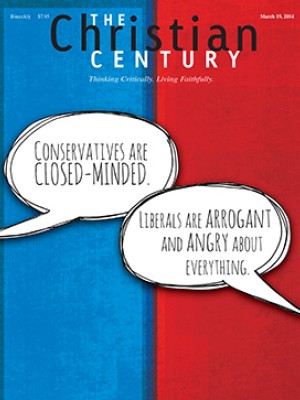Politics in the pulpit? Case by case

Congregational life presents a broad range of conflicts and dilemmas in which theological and ecclesial issues are entwined with the complex drama of human relations. Such challenges are also moments in which Christian witness can be clarified. This fictional narrative, which is followed by an analysis, is the seventh in a series.
Betsy was a pastor in a town with a growing Muslim population. For a while the new immigrants were not very visible, and they kept their religious practices to themselves. But then the community that gathered for Friday prayers in a community college classroom bought a piece of land off of the main thoroughfare, a quarter of a mile away from the bustling downtown, and hired architects to draw up plans for a modest mosque. The mosque would start out as a basic concrete block structure, but it would have room to expand.
Read our latest issue or browse back issues.
When a neighborhood group heard about the plan, its members began doing everything that they could to stop the construction. When the group couldn’t halt construction, it tried to make sure that the mosque stayed out of sight. The neighbors called for zoning laws that would limit certain types of architecture and require a large hedge to hide the building from the road.
Each morning, as Betsy scrolled through the news on her local paper’s homepage, she cringed as she read the letters from people angry about the mosque. Betsy had been working with an interfaith group for over ten years, and she had never encountered the outright hostility that was being directed against the Muslim community.
She knew that things had become much more difficult for Muslims in the United States since 2001. At the interfaith meetings, a local imam had spoken of the discrimination Muslims faced. That discrimination seemed to be increasing as people heard about plans for the mosque. Some members of the mosque were denied a rental property. Muslim women became worried about wearing burqas because they had endured racist verbal attacks on the street erupting from passing cars. Girls had been pressured to take off their hijabs in school. Muslim children had been bullied at school, and when the parents complained, the administration didn’t respond.
Sickened by what was happening in the community, Betsy longed to do something. That Sunday, the Gospel text was the story of the Good Samaritan. Betsy asked what the congregation’s response should be to the person who had been beaten and left on the side of the road. She told of the difficulties that the Muslim community had endured over the decade and explained how it was time for the congregation to show love and compassion for people who were different. Reviewing American history, Betsy elucidated how Catholics and Jews had been treated poorly and said that Muslims were suffering the same plight. Betsy said that residents needed to have face-to-face conversations with the Muslims in the community. She also explained the meaning of separation between church and state and the need to safeguard religious liberties.
Since Betsy had always worked hard to work across interfaith lines and had made it clear that this was one of her core commitments, she didn’t expect there would be any problems with her message in the congregation. But in the fellowship hall afterward she could feel the tension. Michael, a prominent member of the Chamber of Commerce, had his arms crossed as he talked with Anne, who owned a real estate agency. Michael said to Betsy, “Come on over here. We need to have a word with you.”
When Betsy walked over, Anne started in. “When I come to church, I come to rest. I come to be refreshed. I come in order to have my batteries recharged, so I can face the rest of the week. I don’t come here to hash out politics. We shouldn’t have any politics in the pulpit.”
“Politics? What do you mean?” asked Betsy.
“When you’re up there, telling us what the city government should do, that’s politics!” Michael said. “Talk about separation of church and state! Why should you stand up in the pulpit and preach about city zoning? Don’t you think that violates the separation of church and state? It’s almost every week. You preached about Jesus feeding the 5,000—a sermon which happened to coincide with Congress wanting to cut food assistance programs. There was the time when you declared that God is a God of peace—just when the country was considering an attack in Syria. It’s like you’re making Jesus a pundit on MSNBC.”
Anne explained, “I have to deal with these Muslims all week long at the office. It will destroy property values if they build a minaret in our downtown. This is such a headache for me. I certainly don’t want to hear about this on Sunday morning.
“Plus,” Anne continued, her brow furrowed in frustration, “Islam is terrible in its treatment of women. These women walk around with head coverings. You have taught us so differently than that. Why would you want to protect such a demeaning practice? I have always looked up to you for defending women. I can’t believe you would take Islam’s side over Christianity, when they believe that women should submit like that.”
Betsy was speechless. She hadn’t expected to have this conversation.






